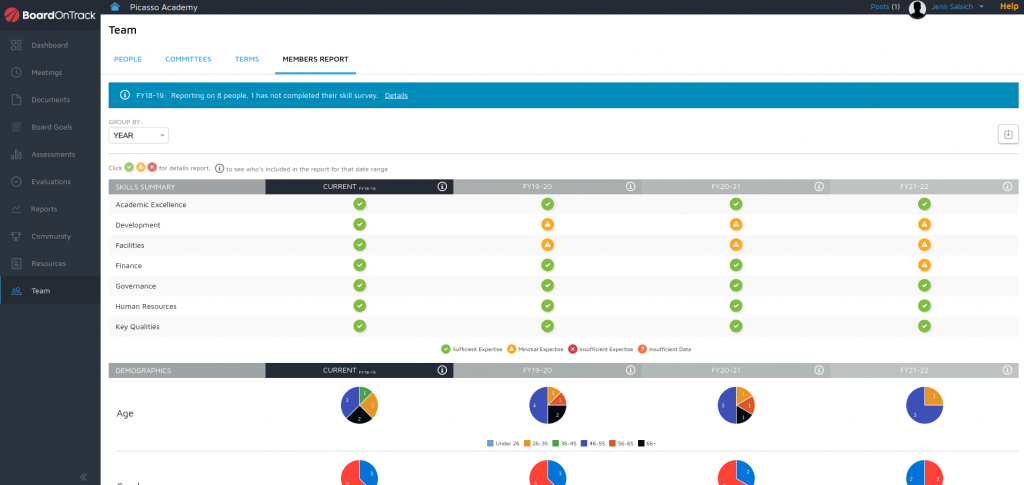
How to Form and Run an Academic Excellence Committee
Academic excellence is central to your mission. It’s your reason for being. That makes this one, arguably, the most important committee. And the hardest one to get right.
First, get clear on what the Academic Excellence Committee does.
A common mistake we see are boards forming an Education Committee, Program Committee, or Curriculum Committee. Usually the focus of these types of committees is wrong — these items are management, and not part of the board’s work. An effective board focus on results/outputs not the inputs. We highly recommend that you shift your thinking and nix these committees and swap them out for an Academic Excellence Committee.
To understand how this committee should function, it can be helpful to look at a more straightforward committee: the Finance Committee.
There’s a clear structure in place for what the Finance Committee does, and how.
The books have to be closed each month. You’ll have to do an audit. You have an annual budgeting cycle. And, throughout the year, the finance committee’s monitoring budgets to actuals.
Your Academic Excellence committee should follow a similar course. Clearly, instead of focusing on the financials, you’re focusing on academic achievement data.
The committee’s primary focus is to work with the CEO to develop a plan to define and monitor academic results.
You’re talking about the goals and the parameters in the committee. You’re bringing thorny things or strategic issues to the full board for discussion.
Secondarily, the committee’s job is to help educate the full board to ensure it’s able to conduct proper governance oversight of the academic program.
You’re educating the full board so that they can fully contribute to the conversations you put on the agenda. And, ultimately, the full board votes to approve the academic goals that you’ll monitor throughout the year.
It’s easy to get so focused on that work with the CEO, that the education of your full board gets a short shrift. But, to be an effective, results-driven, data-driven board, you’ve got to cover both practices.
The committee works in partnership with your CEO or an academic lead that they delegate this responsibility to.
Your roles are different, but complementary. The board focuses on results. The CEO focuses on the means to get to the results.
All instructional decision-making falls in the realm of the means to get to the results.
The committee isn’t directly doing the work. They’re making sure that good practices are happening and they’re getting optimized, year over year.
The CEO selects and implements your curricula.
The committee should not select, design, or review the quality of the curriculum. However, the committee can be a sounding board for the CEO’s ideas.
The committee is looking at the data, seeing the trends, and giving the CEO a place to think out loud about what’s working and not working.
And, the committee should make sure there’s a system in place to replicate academic success. You’re ensuring you’re building success with sustainability.
The CEO hires and trains all the staff, and oversees and evaluates them.
The committee does not evaluate teachers, plan professional development for teachers, or interact with teachers on a regular basis. This is all within the CEO’s realm.
The committee ensures that the CEO creates and implements staff evaluation and feedback procedures.
They monitor the results of the CEO’s evaluations and feedback procedures — generally, through annual or biannual staff surveys and staff retention data.
In addition, they definitely shouldn’t interact with families or students on a regular basis. You don’t want the Academic Excellence Committee to present themselves as an outlet for staff, family, or student complaints or concerns that haven’t formerly been addressed by the CEO.
What if you don’t have enough people for the committee? Or, what if you don’t have the right people for the committee?
If your board is too small to have all the committees that we recommend, or you don’t have the right people with the right skills for this committee, you can still maintain this key function. Even if you’re pre-doors, or in your founding years.
You could run this as a committee of the whole — the whole board focusing on the Academic Excellence Committee’s role together.
This is especially wise for new boards, as academic excellence is often the place where most trustees have the steepest learning curve.
This approach will ensure that you maintain a focus on academic results, even while you seek to recruit a really great person to lead the committee going forward.
Alternatively, if you have one person with the right skillset, you could make it a committee of one for now.
Task the one person you’ve got with the responsibility to lead this function, and to expand it.
They might know other people who could be pulled in as non-board members who only serve on that committee. {We highly recommend this practice as a way to build succession-planning into your board recruiting.}
Think about it — if I’m chairing the finance committee, I’m likely someone who works in finance. I’m likely to know other people who would have the right skills to help build out the committee. I can recruit them to my committee of one, as non-board members who solely serve on that committee…at first.
Figure out how you’re going to grow your board to sufficiently staff your committee.
For any board recruiting, you’ve got to know exactly which skills you need today — and how your needs will change over time. This is as true for the academic excellence function as it is for any other specialized role, or your board as a whole.
We designed the skills inventory in BoardOnTrack to make this simple. You can see, at a glance, which skills you’ve got represented in your trustees today, which you need to add to boost your board’s capabilities, and how this will change over the next three years as people’s terms expire. {Learn more about strategic board recruiting with our three-year recruiting roadmap here.}

Usually, it’s someone on the management team who puts in the term limits. Then, you ask all the trustees took up in their profile and just check which skills they have. There are sections about academic skills, as well as finance and more.
Once your trustees have logged their skills, BoardOnTrack automatically creates for you a three-year board recruitment roadmap.
Looking at the roadmap, you can ask yourself: “Do I have the right skills here? And do I have enough bench strength?” With trustees rotating off and onto the board, you can be really purposeful about building up the strengths you need in order to ensure your board can contribute to your academic excellence goals.
Should teachers be on the Academic Excellence Committee?
The more objectivity you have on your board, the better.
To preserve objectivity, we recommend that your board be built mostly of people representing the community. And fewer than one-third should be people directly connected to what’s happening at your school — mostly, teachers or parents.
Plus, having teachers on this committee can quickly lead to the board stepping over into the management line.
However, the academic leadership absolutely should be engaged with this committee. That includes your school leader, executive director, principal, or CEO. And, if you have one, a Chief Academic Officer — whoever’s in charge of the academic program.
There can be exceptions to this rule, of course.
Imagine that, this year, there’s a huge overhaul of the math curriculum. Your CEO and Chief Academic Officer want the teacher who’s leading the curriculum overhaul to be part of the Academic Excellence Committee this year. After all, this is a high-priority effort.
The teacher is, for this effort, in a leadership position. In this case, it does make sense to include a teacher on the committee. But, this is an exception. Normally, we wouldn’t recommend it.
Do you need professional educators to serve on your Academic Excellence Committee?
Certainly, you should have some people on this committee who have a background in education. But they don’t all have to be educators.
You’re not there to pick curriculum or evaluate teachers. You’re there to look at goals, and know if they’re overly ambitious or not. And you’re there to monitor.
People who have strong analytical skills, who are good at looking at data, can be excellent members of the academic excellence committee. They’re likely to ask the right questions, by interpreting the data. And, they don’t have a lot of preconceived ideas about what they should be seeing.
For instance, people who work for management consulting companies, like Mckinsey or Bain, look at data from companies all the time. They tend to add a lot of value on these committees.
A strong Academic Excellence Committee is core to your board’s reason for being.
Your board doesn’t exist simply to hold meetings and talk about your organization. It’s there to make a real difference for your organization and the kids depending on it. And that means maintaining a focus on academic excellence by forming and running an Academic Excellence Committee.
Even if your board isn’t quite large enough to fully staff every committee you’ll eventually have, and even if you don’t have professional educators on the board, you can effectively staff and run this function.

Marci Cornell-Feist
With more than two decades in the field, Marci Cornell-Feist is a national expert on charter school governance whose work has helped more than 500 charter schools nationwide. Marci created BoardOnTrack to implement the most effective strategies and practices of her many clients, and as a means of spreading this information to a wider audience of charter schools. She's also a co-founder of The Achievement Network, which helps schools use data-driven strategies to raise student achievement, and previously founded and led the charter school consultancy, Meetinghouse Solutions.


